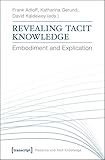Revealing Tacit Knowledge : Embodiment and Explication / ed. by David Kaldewey, Katharina Gerund, Frank Adloff.
Material type: TextSeries: Präsenz und implizites Wissen ; 2Publisher: Bielefeld : transcript Verlag, [2015]Copyright date: 2015Edition: 1. AuflDescription: 1 online resource (308 p.)Content type:
TextSeries: Präsenz und implizites Wissen ; 2Publisher: Bielefeld : transcript Verlag, [2015]Copyright date: 2015Edition: 1. AuflDescription: 1 online resource (308 p.)Content type: - 9783837625165
- 9783839425169
- Knowledge management
- Tacit knowledge
- Body
- Cultural Studies
- Cultural Theory
- Culture
- Discourse
- Metaphors and Embodiment
- Sociology of Culture
- Tacit Knowledge and Epistemology
- SOCIAL SCIENCE / Popular Culture
- Body
- Cultural Studies
- Cultural Theory
- Culture
- Discourse
- Metaphors and Embodiment
- Sociology of Culture
- Tacit Knowledge and Epistemology
- 306 22/ger
- BF317.5
- online - DeGruyter
| Item type | Current library | Call number | URL | Status | Notes | Barcode | |
|---|---|---|---|---|---|---|---|
 eBook
eBook
|
Biblioteca "Angelicum" Pont. Univ. S.Tommaso d'Aquino Nuvola online | online - DeGruyter (Browse shelf(Opens below)) | Online access | Not for loan (Accesso limitato) | Accesso per gli utenti autorizzati / Access for authorized users | (dgr)9783839425169 |
Frontmatter -- Content -- Locations, Translations, and Presentifications of Tacit Knowledge -- Part I: Locations -- Tacit Knowledge: Shared and Embodied -- Embodiment of Tacit Knowledge -- The Background of Moods and Atmospheres -- Tacit Knowledge in a Differentiated Society -- Questions to Theodore R. Schatzki -- Part II: Translations -- First- and Second-Order Tacit Knowledge -- Tacit Knowledge and Analytic Autoethnography -- Racial Formation, Implicit Understanding, and Problems with Implicit Association Tests -- For a Sociology of Flesh and Blood -- Part III: Presentifications -- Tacit Knowledge, Public Feeling, and the Pursuits of (Un-)Happiness -- The End of Life and the Limits of Explication -- Moving Images of Thought -- Questions to Mark Johnson -- List of Contributors
restricted access online access with authorization star
http://purl.org/coar/access_right/c_16ec
How does tacit knowledge inscribe itself into cultural and social practices?As the established distinction between tacit and explicit or discursive forms of knowledge does not explain this question, the contributions in this volume reconstruct, describe, and analyze the manifold processes by which the tacit reveals itself: They focus, for example, on metaphors, feelings, and visualizations as explications of the tacit as well as on processes of embodiment. Taken together, they demonstrate that the tacit does not constitute a single or unified knowledge complex, but has to be understood in its differentiated and fragmented forms. In addition to scholarly essays, the volume features interviews with Mark Johnson, Theodore Schatzki, and Loïc Wacquant.
Mode of access: Internet via World Wide Web.
In English.
Description based on online resource; title from PDF title page (publisher's Web site, viewed 19. Oct 2024)


